7001HSV Research Proposal: Music Therapy's Role in Dementia Care
VerifiedAdded on 2023/01/19
|15
|3639
|83
Project
AI Summary
This research proposal investigates the effectiveness of music therapy combined with pharmacological interventions in treating dementia patients within residential care facilities. The study aims to evaluate whether the combined approach improves overall health outcomes, cognitive functions, and psychological symptoms compared to conventional pharmacological treatments alone. The research design employs a quantitative experimental approach, comparing a group receiving both music therapy and medication to a control group receiving only medication. Data collection involves structured observation, with statistical analysis using SPSS software to analyze the impact of music therapy on dependent variables such as pain, cognition, anxiety, and emotional distress. Ethical considerations, including obtaining consent from patients and their families, are meticulously addressed. The study is planned in three phases, involving ethical approval, participant selection, data collection, and analysis. The research seeks to address the gap in current literature by examining the combined effects of music therapy and pharmacological treatments, potentially providing valuable insights into improved care strategies for dementia patients.
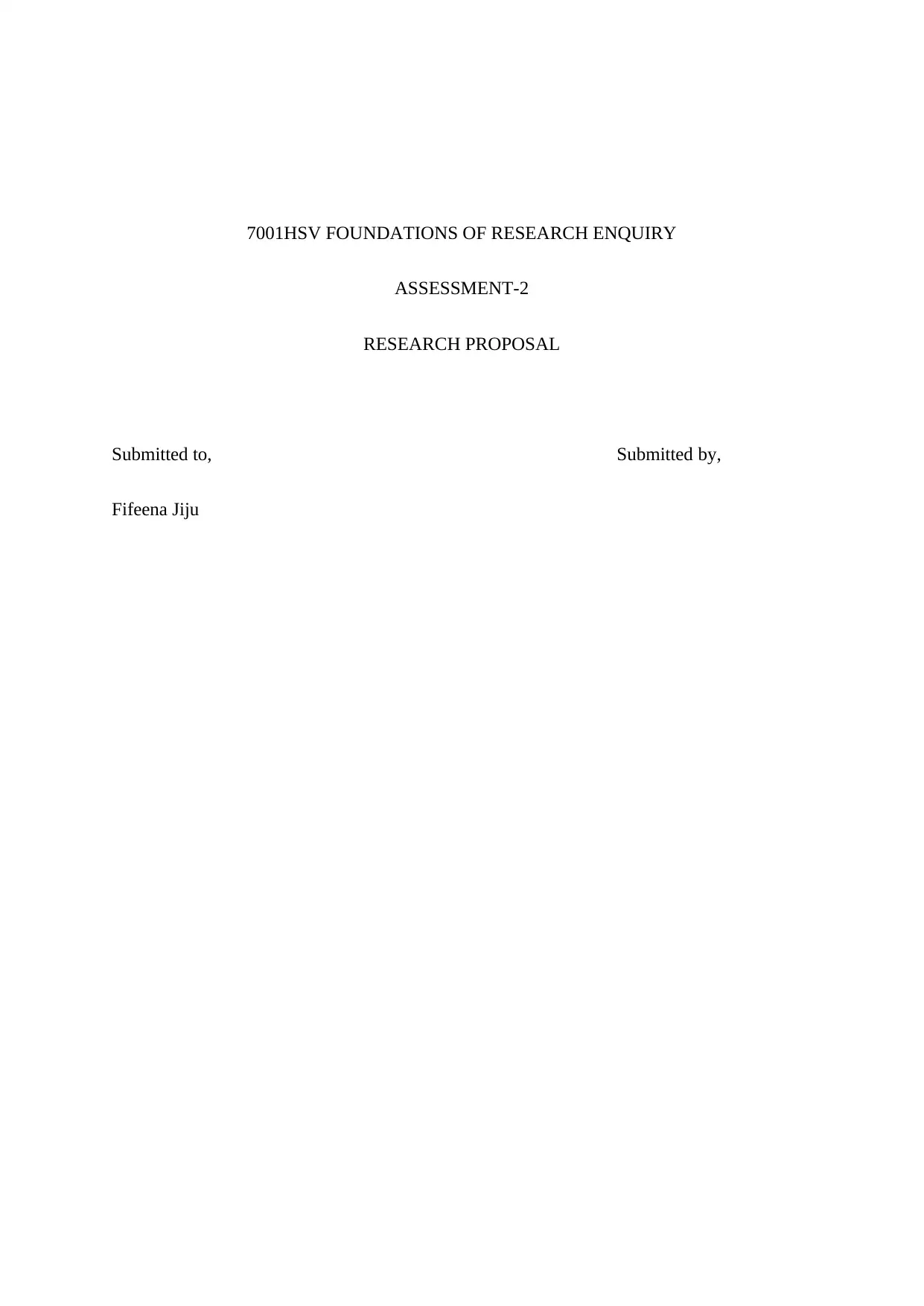
7001HSV FOUNDATIONS OF RESEARCH ENQUIRY
ASSESSMENT-2
RESEARCH PROPOSAL
Submitted to, Submitted by,
Fifeena Jiju
ASSESSMENT-2
RESEARCH PROPOSAL
Submitted to, Submitted by,
Fifeena Jiju
Paraphrase This Document
Need a fresh take? Get an instant paraphrase of this document with our AI Paraphraser
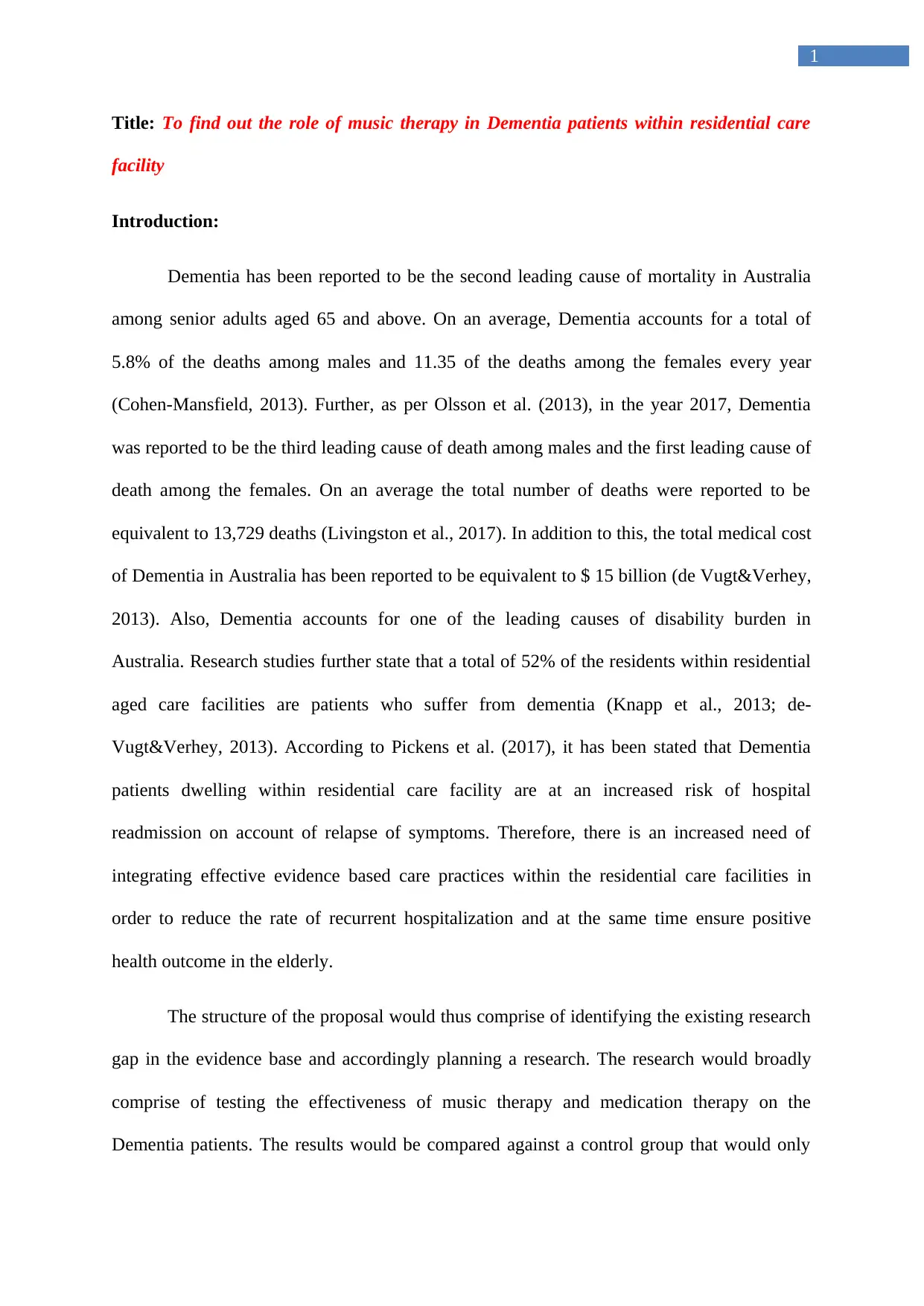
1
Title: To find out the role of music therapy in Dementia patients within residential care
facility
Introduction:
Dementia has been reported to be the second leading cause of mortality in Australia
among senior adults aged 65 and above. On an average, Dementia accounts for a total of
5.8% of the deaths among males and 11.35 of the deaths among the females every year
(Cohen-Mansfield, 2013). Further, as per Olsson et al. (2013), in the year 2017, Dementia
was reported to be the third leading cause of death among males and the first leading cause of
death among the females. On an average the total number of deaths were reported to be
equivalent to 13,729 deaths (Livingston et al., 2017). In addition to this, the total medical cost
of Dementia in Australia has been reported to be equivalent to $ 15 billion (de Vugt&Verhey,
2013). Also, Dementia accounts for one of the leading causes of disability burden in
Australia. Research studies further state that a total of 52% of the residents within residential
aged care facilities are patients who suffer from dementia (Knapp et al., 2013; de-
Vugt&Verhey, 2013). According to Pickens et al. (2017), it has been stated that Dementia
patients dwelling within residential care facility are at an increased risk of hospital
readmission on account of relapse of symptoms. Therefore, there is an increased need of
integrating effective evidence based care practices within the residential care facilities in
order to reduce the rate of recurrent hospitalization and at the same time ensure positive
health outcome in the elderly.
The structure of the proposal would thus comprise of identifying the existing research
gap in the evidence base and accordingly planning a research. The research would broadly
comprise of testing the effectiveness of music therapy and medication therapy on the
Dementia patients. The results would be compared against a control group that would only
Title: To find out the role of music therapy in Dementia patients within residential care
facility
Introduction:
Dementia has been reported to be the second leading cause of mortality in Australia
among senior adults aged 65 and above. On an average, Dementia accounts for a total of
5.8% of the deaths among males and 11.35 of the deaths among the females every year
(Cohen-Mansfield, 2013). Further, as per Olsson et al. (2013), in the year 2017, Dementia
was reported to be the third leading cause of death among males and the first leading cause of
death among the females. On an average the total number of deaths were reported to be
equivalent to 13,729 deaths (Livingston et al., 2017). In addition to this, the total medical cost
of Dementia in Australia has been reported to be equivalent to $ 15 billion (de Vugt&Verhey,
2013). Also, Dementia accounts for one of the leading causes of disability burden in
Australia. Research studies further state that a total of 52% of the residents within residential
aged care facilities are patients who suffer from dementia (Knapp et al., 2013; de-
Vugt&Verhey, 2013). According to Pickens et al. (2017), it has been stated that Dementia
patients dwelling within residential care facility are at an increased risk of hospital
readmission on account of relapse of symptoms. Therefore, there is an increased need of
integrating effective evidence based care practices within the residential care facilities in
order to reduce the rate of recurrent hospitalization and at the same time ensure positive
health outcome in the elderly.
The structure of the proposal would thus comprise of identifying the existing research
gap in the evidence base and accordingly planning a research. The research would broadly
comprise of testing the effectiveness of music therapy and medication therapy on the
Dementia patients. The results would be compared against a control group that would only
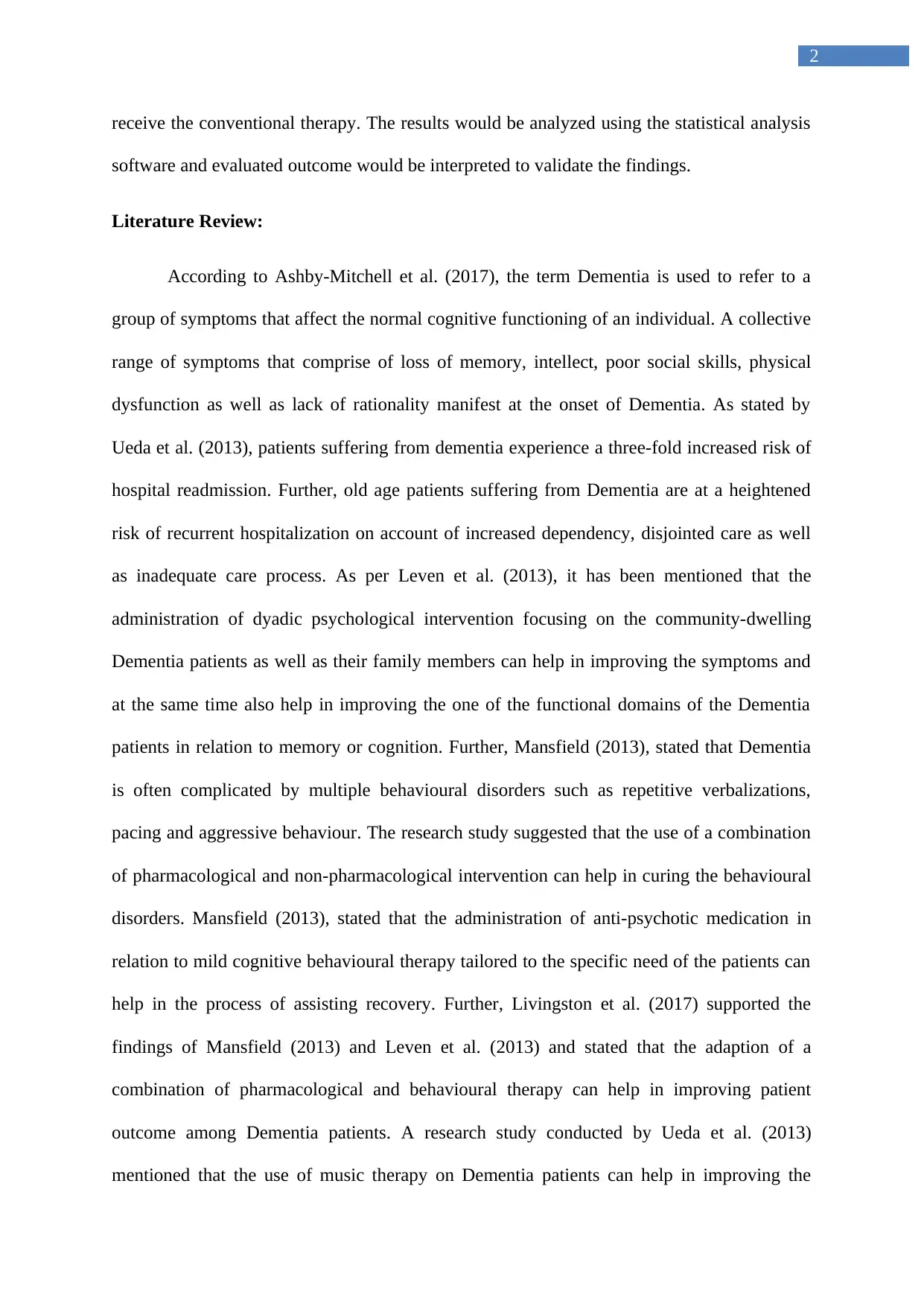
2
receive the conventional therapy. The results would be analyzed using the statistical analysis
software and evaluated outcome would be interpreted to validate the findings.
Literature Review:
According to Ashby-Mitchell et al. (2017), the term Dementia is used to refer to a
group of symptoms that affect the normal cognitive functioning of an individual. A collective
range of symptoms that comprise of loss of memory, intellect, poor social skills, physical
dysfunction as well as lack of rationality manifest at the onset of Dementia. As stated by
Ueda et al. (2013), patients suffering from dementia experience a three-fold increased risk of
hospital readmission. Further, old age patients suffering from Dementia are at a heightened
risk of recurrent hospitalization on account of increased dependency, disjointed care as well
as inadequate care process. As per Leven et al. (2013), it has been mentioned that the
administration of dyadic psychological intervention focusing on the community-dwelling
Dementia patients as well as their family members can help in improving the symptoms and
at the same time also help in improving the one of the functional domains of the Dementia
patients in relation to memory or cognition. Further, Mansfield (2013), stated that Dementia
is often complicated by multiple behavioural disorders such as repetitive verbalizations,
pacing and aggressive behaviour. The research study suggested that the use of a combination
of pharmacological and non-pharmacological intervention can help in curing the behavioural
disorders. Mansfield (2013), stated that the administration of anti-psychotic medication in
relation to mild cognitive behavioural therapy tailored to the specific need of the patients can
help in the process of assisting recovery. Further, Livingston et al. (2017) supported the
findings of Mansfield (2013) and Leven et al. (2013) and stated that the adaption of a
combination of pharmacological and behavioural therapy can help in improving patient
outcome among Dementia patients. A research study conducted by Ueda et al. (2013)
mentioned that the use of music therapy on Dementia patients can help in improving the
receive the conventional therapy. The results would be analyzed using the statistical analysis
software and evaluated outcome would be interpreted to validate the findings.
Literature Review:
According to Ashby-Mitchell et al. (2017), the term Dementia is used to refer to a
group of symptoms that affect the normal cognitive functioning of an individual. A collective
range of symptoms that comprise of loss of memory, intellect, poor social skills, physical
dysfunction as well as lack of rationality manifest at the onset of Dementia. As stated by
Ueda et al. (2013), patients suffering from dementia experience a three-fold increased risk of
hospital readmission. Further, old age patients suffering from Dementia are at a heightened
risk of recurrent hospitalization on account of increased dependency, disjointed care as well
as inadequate care process. As per Leven et al. (2013), it has been mentioned that the
administration of dyadic psychological intervention focusing on the community-dwelling
Dementia patients as well as their family members can help in improving the symptoms and
at the same time also help in improving the one of the functional domains of the Dementia
patients in relation to memory or cognition. Further, Mansfield (2013), stated that Dementia
is often complicated by multiple behavioural disorders such as repetitive verbalizations,
pacing and aggressive behaviour. The research study suggested that the use of a combination
of pharmacological and non-pharmacological intervention can help in curing the behavioural
disorders. Mansfield (2013), stated that the administration of anti-psychotic medication in
relation to mild cognitive behavioural therapy tailored to the specific need of the patients can
help in the process of assisting recovery. Further, Livingston et al. (2017) supported the
findings of Mansfield (2013) and Leven et al. (2013) and stated that the adaption of a
combination of pharmacological and behavioural therapy can help in improving patient
outcome among Dementia patients. A research study conducted by Ueda et al. (2013)
mentioned that the use of music therapy on Dementia patients can help in improving the
⊘ This is a preview!⊘
Do you want full access?
Subscribe today to unlock all pages.

Trusted by 1+ million students worldwide
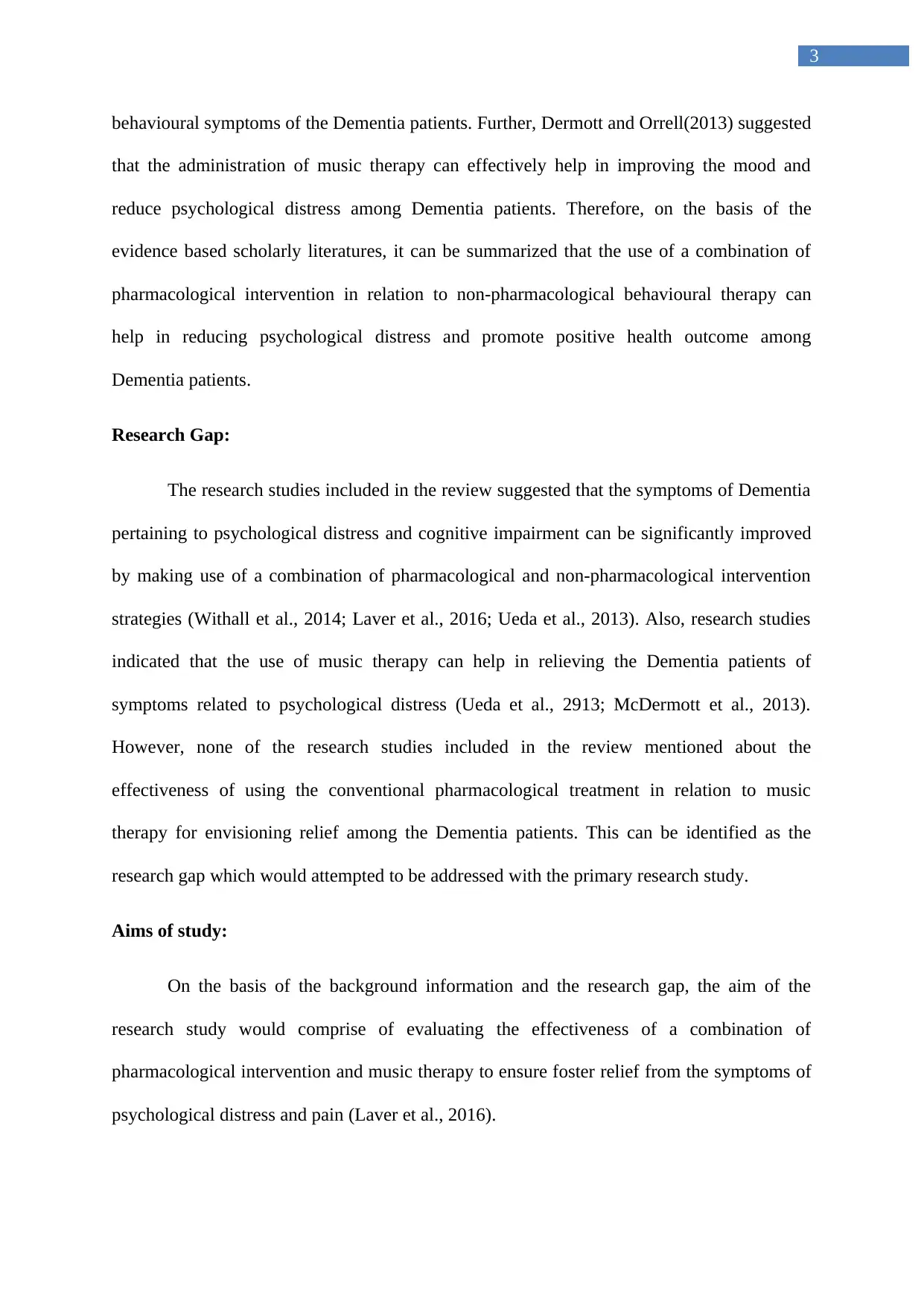
3
behavioural symptoms of the Dementia patients. Further, Dermott and Orrell(2013) suggested
that the administration of music therapy can effectively help in improving the mood and
reduce psychological distress among Dementia patients. Therefore, on the basis of the
evidence based scholarly literatures, it can be summarized that the use of a combination of
pharmacological intervention in relation to non-pharmacological behavioural therapy can
help in reducing psychological distress and promote positive health outcome among
Dementia patients.
Research Gap:
The research studies included in the review suggested that the symptoms of Dementia
pertaining to psychological distress and cognitive impairment can be significantly improved
by making use of a combination of pharmacological and non-pharmacological intervention
strategies (Withall et al., 2014; Laver et al., 2016; Ueda et al., 2013). Also, research studies
indicated that the use of music therapy can help in relieving the Dementia patients of
symptoms related to psychological distress (Ueda et al., 2913; McDermott et al., 2013).
However, none of the research studies included in the review mentioned about the
effectiveness of using the conventional pharmacological treatment in relation to music
therapy for envisioning relief among the Dementia patients. This can be identified as the
research gap which would attempted to be addressed with the primary research study.
Aims of study:
On the basis of the background information and the research gap, the aim of the
research study would comprise of evaluating the effectiveness of a combination of
pharmacological intervention and music therapy to ensure foster relief from the symptoms of
psychological distress and pain (Laver et al., 2016).
behavioural symptoms of the Dementia patients. Further, Dermott and Orrell(2013) suggested
that the administration of music therapy can effectively help in improving the mood and
reduce psychological distress among Dementia patients. Therefore, on the basis of the
evidence based scholarly literatures, it can be summarized that the use of a combination of
pharmacological intervention in relation to non-pharmacological behavioural therapy can
help in reducing psychological distress and promote positive health outcome among
Dementia patients.
Research Gap:
The research studies included in the review suggested that the symptoms of Dementia
pertaining to psychological distress and cognitive impairment can be significantly improved
by making use of a combination of pharmacological and non-pharmacological intervention
strategies (Withall et al., 2014; Laver et al., 2016; Ueda et al., 2013). Also, research studies
indicated that the use of music therapy can help in relieving the Dementia patients of
symptoms related to psychological distress (Ueda et al., 2913; McDermott et al., 2013).
However, none of the research studies included in the review mentioned about the
effectiveness of using the conventional pharmacological treatment in relation to music
therapy for envisioning relief among the Dementia patients. This can be identified as the
research gap which would attempted to be addressed with the primary research study.
Aims of study:
On the basis of the background information and the research gap, the aim of the
research study would comprise of evaluating the effectiveness of a combination of
pharmacological intervention and music therapy to ensure foster relief from the symptoms of
psychological distress and pain (Laver et al., 2016).
Paraphrase This Document
Need a fresh take? Get an instant paraphrase of this document with our AI Paraphraser
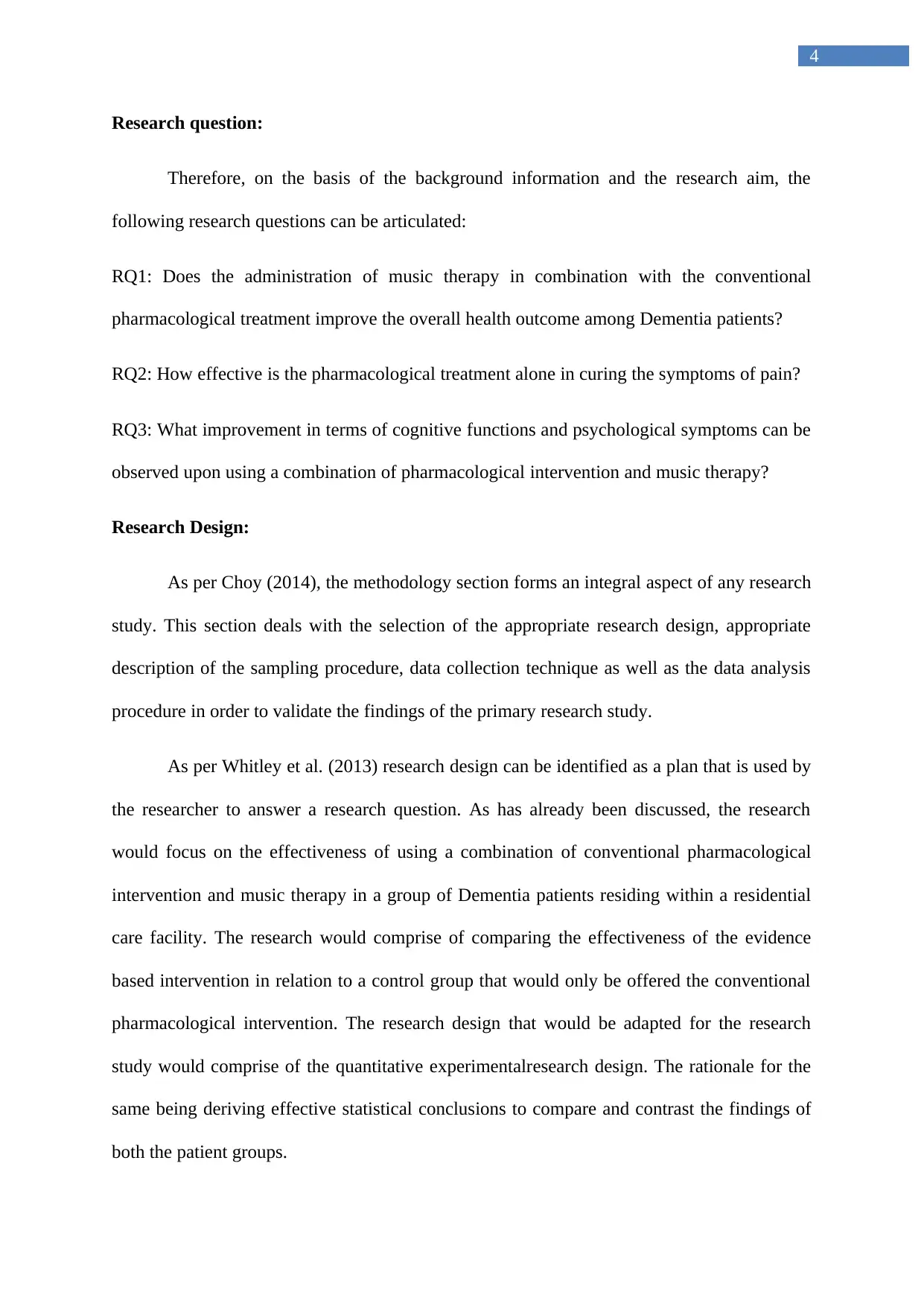
4
Research question:
Therefore, on the basis of the background information and the research aim, the
following research questions can be articulated:
RQ1: Does the administration of music therapy in combination with the conventional
pharmacological treatment improve the overall health outcome among Dementia patients?
RQ2: How effective is the pharmacological treatment alone in curing the symptoms of pain?
RQ3: What improvement in terms of cognitive functions and psychological symptoms can be
observed upon using a combination of pharmacological intervention and music therapy?
Research Design:
As per Choy (2014), the methodology section forms an integral aspect of any research
study. This section deals with the selection of the appropriate research design, appropriate
description of the sampling procedure, data collection technique as well as the data analysis
procedure in order to validate the findings of the primary research study.
As per Whitley et al. (2013) research design can be identified as a plan that is used by
the researcher to answer a research question. As has already been discussed, the research
would focus on the effectiveness of using a combination of conventional pharmacological
intervention and music therapy in a group of Dementia patients residing within a residential
care facility. The research would comprise of comparing the effectiveness of the evidence
based intervention in relation to a control group that would only be offered the conventional
pharmacological intervention. The research design that would be adapted for the research
study would comprise of the quantitative experimentalresearch design. The rationale for the
same being deriving effective statistical conclusions to compare and contrast the findings of
both the patient groups.
Research question:
Therefore, on the basis of the background information and the research aim, the
following research questions can be articulated:
RQ1: Does the administration of music therapy in combination with the conventional
pharmacological treatment improve the overall health outcome among Dementia patients?
RQ2: How effective is the pharmacological treatment alone in curing the symptoms of pain?
RQ3: What improvement in terms of cognitive functions and psychological symptoms can be
observed upon using a combination of pharmacological intervention and music therapy?
Research Design:
As per Choy (2014), the methodology section forms an integral aspect of any research
study. This section deals with the selection of the appropriate research design, appropriate
description of the sampling procedure, data collection technique as well as the data analysis
procedure in order to validate the findings of the primary research study.
As per Whitley et al. (2013) research design can be identified as a plan that is used by
the researcher to answer a research question. As has already been discussed, the research
would focus on the effectiveness of using a combination of conventional pharmacological
intervention and music therapy in a group of Dementia patients residing within a residential
care facility. The research would comprise of comparing the effectiveness of the evidence
based intervention in relation to a control group that would only be offered the conventional
pharmacological intervention. The research design that would be adapted for the research
study would comprise of the quantitative experimentalresearch design. The rationale for the
same being deriving effective statistical conclusions to compare and contrast the findings of
both the patient groups.
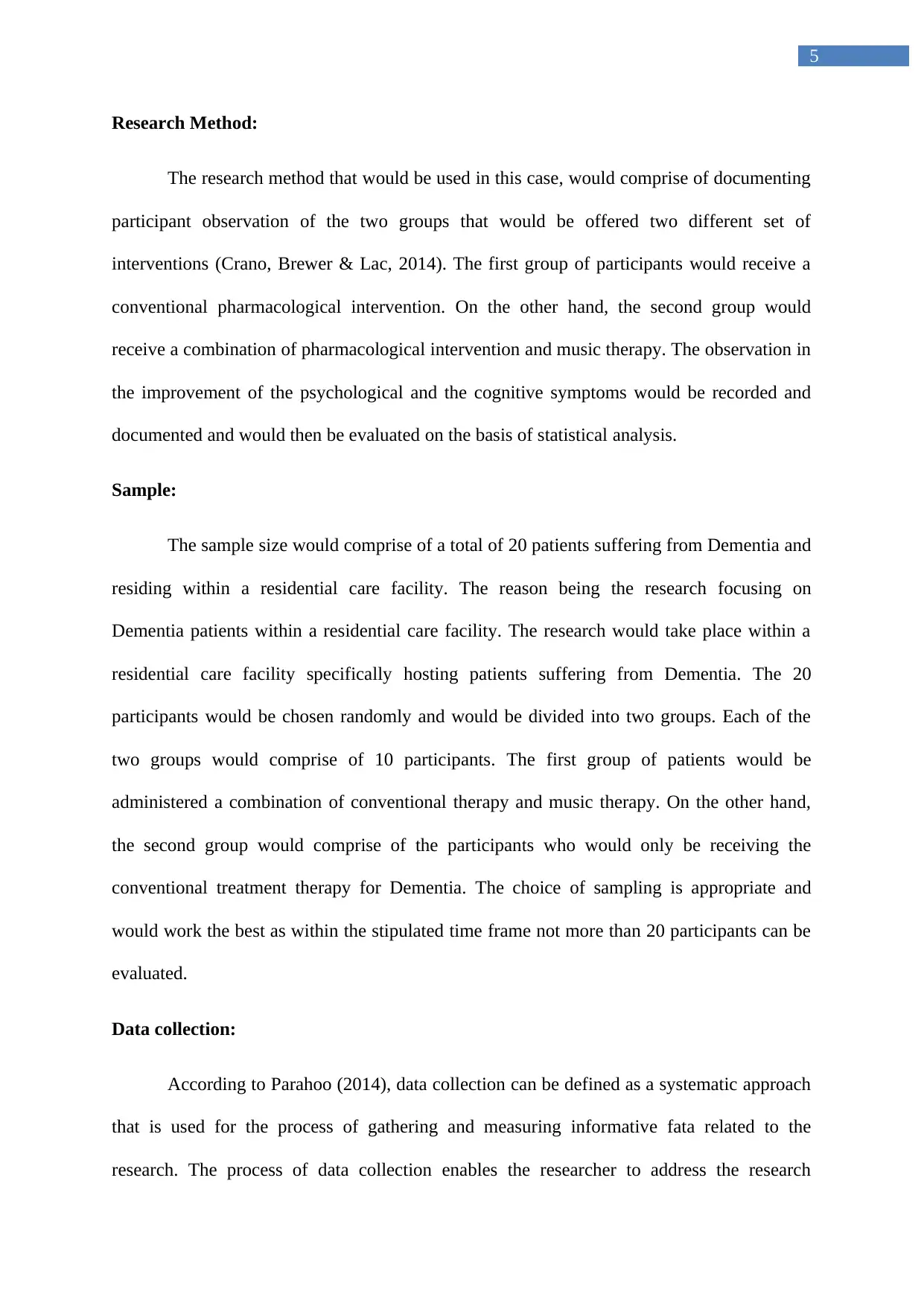
5
Research Method:
The research method that would be used in this case, would comprise of documenting
participant observation of the two groups that would be offered two different set of
interventions (Crano, Brewer & Lac, 2014). The first group of participants would receive a
conventional pharmacological intervention. On the other hand, the second group would
receive a combination of pharmacological intervention and music therapy. The observation in
the improvement of the psychological and the cognitive symptoms would be recorded and
documented and would then be evaluated on the basis of statistical analysis.
Sample:
The sample size would comprise of a total of 20 patients suffering from Dementia and
residing within a residential care facility. The reason being the research focusing on
Dementia patients within a residential care facility. The research would take place within a
residential care facility specifically hosting patients suffering from Dementia. The 20
participants would be chosen randomly and would be divided into two groups. Each of the
two groups would comprise of 10 participants. The first group of patients would be
administered a combination of conventional therapy and music therapy. On the other hand,
the second group would comprise of the participants who would only be receiving the
conventional treatment therapy for Dementia. The choice of sampling is appropriate and
would work the best as within the stipulated time frame not more than 20 participants can be
evaluated.
Data collection:
According to Parahoo (2014), data collection can be defined as a systematic approach
that is used for the process of gathering and measuring informative fata related to the
research. The process of data collection enables the researcher to address the research
Research Method:
The research method that would be used in this case, would comprise of documenting
participant observation of the two groups that would be offered two different set of
interventions (Crano, Brewer & Lac, 2014). The first group of participants would receive a
conventional pharmacological intervention. On the other hand, the second group would
receive a combination of pharmacological intervention and music therapy. The observation in
the improvement of the psychological and the cognitive symptoms would be recorded and
documented and would then be evaluated on the basis of statistical analysis.
Sample:
The sample size would comprise of a total of 20 patients suffering from Dementia and
residing within a residential care facility. The reason being the research focusing on
Dementia patients within a residential care facility. The research would take place within a
residential care facility specifically hosting patients suffering from Dementia. The 20
participants would be chosen randomly and would be divided into two groups. Each of the
two groups would comprise of 10 participants. The first group of patients would be
administered a combination of conventional therapy and music therapy. On the other hand,
the second group would comprise of the participants who would only be receiving the
conventional treatment therapy for Dementia. The choice of sampling is appropriate and
would work the best as within the stipulated time frame not more than 20 participants can be
evaluated.
Data collection:
According to Parahoo (2014), data collection can be defined as a systematic approach
that is used for the process of gathering and measuring informative fata related to the
research. The process of data collection enables the researcher to address the research
⊘ This is a preview!⊘
Do you want full access?
Subscribe today to unlock all pages.

Trusted by 1+ million students worldwide
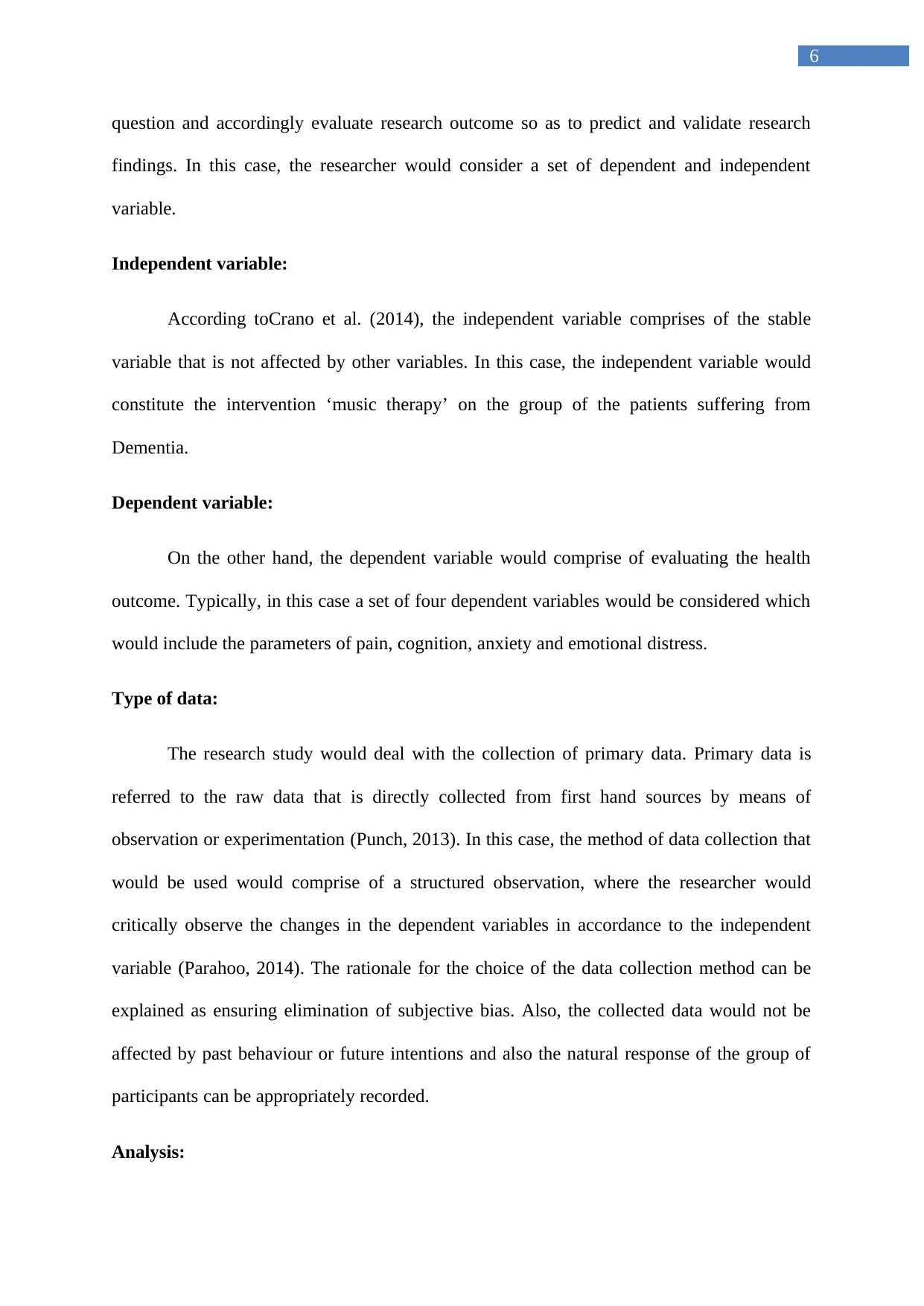
6
question and accordingly evaluate research outcome so as to predict and validate research
findings. In this case, the researcher would consider a set of dependent and independent
variable.
Independent variable:
According toCrano et al. (2014), the independent variable comprises of the stable
variable that is not affected by other variables. In this case, the independent variable would
constitute the intervention ‘music therapy’ on the group of the patients suffering from
Dementia.
Dependent variable:
On the other hand, the dependent variable would comprise of evaluating the health
outcome. Typically, in this case a set of four dependent variables would be considered which
would include the parameters of pain, cognition, anxiety and emotional distress.
Type of data:
The research study would deal with the collection of primary data. Primary data is
referred to the raw data that is directly collected from first hand sources by means of
observation or experimentation (Punch, 2013). In this case, the method of data collection that
would be used would comprise of a structured observation, where the researcher would
critically observe the changes in the dependent variables in accordance to the independent
variable (Parahoo, 2014). The rationale for the choice of the data collection method can be
explained as ensuring elimination of subjective bias. Also, the collected data would not be
affected by past behaviour or future intentions and also the natural response of the group of
participants can be appropriately recorded.
Analysis:
question and accordingly evaluate research outcome so as to predict and validate research
findings. In this case, the researcher would consider a set of dependent and independent
variable.
Independent variable:
According toCrano et al. (2014), the independent variable comprises of the stable
variable that is not affected by other variables. In this case, the independent variable would
constitute the intervention ‘music therapy’ on the group of the patients suffering from
Dementia.
Dependent variable:
On the other hand, the dependent variable would comprise of evaluating the health
outcome. Typically, in this case a set of four dependent variables would be considered which
would include the parameters of pain, cognition, anxiety and emotional distress.
Type of data:
The research study would deal with the collection of primary data. Primary data is
referred to the raw data that is directly collected from first hand sources by means of
observation or experimentation (Punch, 2013). In this case, the method of data collection that
would be used would comprise of a structured observation, where the researcher would
critically observe the changes in the dependent variables in accordance to the independent
variable (Parahoo, 2014). The rationale for the choice of the data collection method can be
explained as ensuring elimination of subjective bias. Also, the collected data would not be
affected by past behaviour or future intentions and also the natural response of the group of
participants can be appropriately recorded.
Analysis:
Paraphrase This Document
Need a fresh take? Get an instant paraphrase of this document with our AI Paraphraser
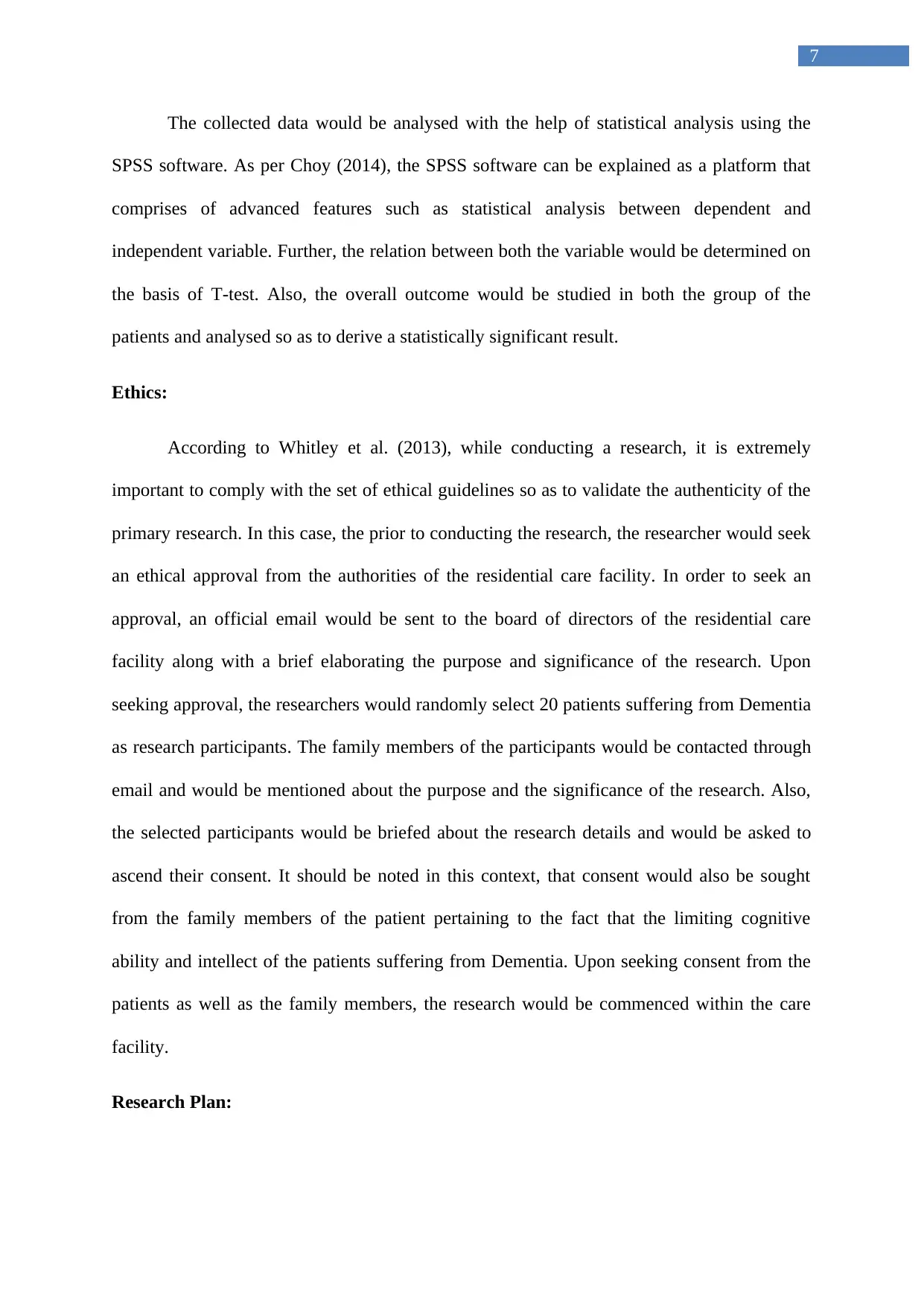
7
The collected data would be analysed with the help of statistical analysis using the
SPSS software. As per Choy (2014), the SPSS software can be explained as a platform that
comprises of advanced features such as statistical analysis between dependent and
independent variable. Further, the relation between both the variable would be determined on
the basis of T-test. Also, the overall outcome would be studied in both the group of the
patients and analysed so as to derive a statistically significant result.
Ethics:
According to Whitley et al. (2013), while conducting a research, it is extremely
important to comply with the set of ethical guidelines so as to validate the authenticity of the
primary research. In this case, the prior to conducting the research, the researcher would seek
an ethical approval from the authorities of the residential care facility. In order to seek an
approval, an official email would be sent to the board of directors of the residential care
facility along with a brief elaborating the purpose and significance of the research. Upon
seeking approval, the researchers would randomly select 20 patients suffering from Dementia
as research participants. The family members of the participants would be contacted through
email and would be mentioned about the purpose and the significance of the research. Also,
the selected participants would be briefed about the research details and would be asked to
ascend their consent. It should be noted in this context, that consent would also be sought
from the family members of the patient pertaining to the fact that the limiting cognitive
ability and intellect of the patients suffering from Dementia. Upon seeking consent from the
patients as well as the family members, the research would be commenced within the care
facility.
Research Plan:
The collected data would be analysed with the help of statistical analysis using the
SPSS software. As per Choy (2014), the SPSS software can be explained as a platform that
comprises of advanced features such as statistical analysis between dependent and
independent variable. Further, the relation between both the variable would be determined on
the basis of T-test. Also, the overall outcome would be studied in both the group of the
patients and analysed so as to derive a statistically significant result.
Ethics:
According to Whitley et al. (2013), while conducting a research, it is extremely
important to comply with the set of ethical guidelines so as to validate the authenticity of the
primary research. In this case, the prior to conducting the research, the researcher would seek
an ethical approval from the authorities of the residential care facility. In order to seek an
approval, an official email would be sent to the board of directors of the residential care
facility along with a brief elaborating the purpose and significance of the research. Upon
seeking approval, the researchers would randomly select 20 patients suffering from Dementia
as research participants. The family members of the participants would be contacted through
email and would be mentioned about the purpose and the significance of the research. Also,
the selected participants would be briefed about the research details and would be asked to
ascend their consent. It should be noted in this context, that consent would also be sought
from the family members of the patient pertaining to the fact that the limiting cognitive
ability and intellect of the patients suffering from Dementia. Upon seeking consent from the
patients as well as the family members, the research would be commenced within the care
facility.
Research Plan:
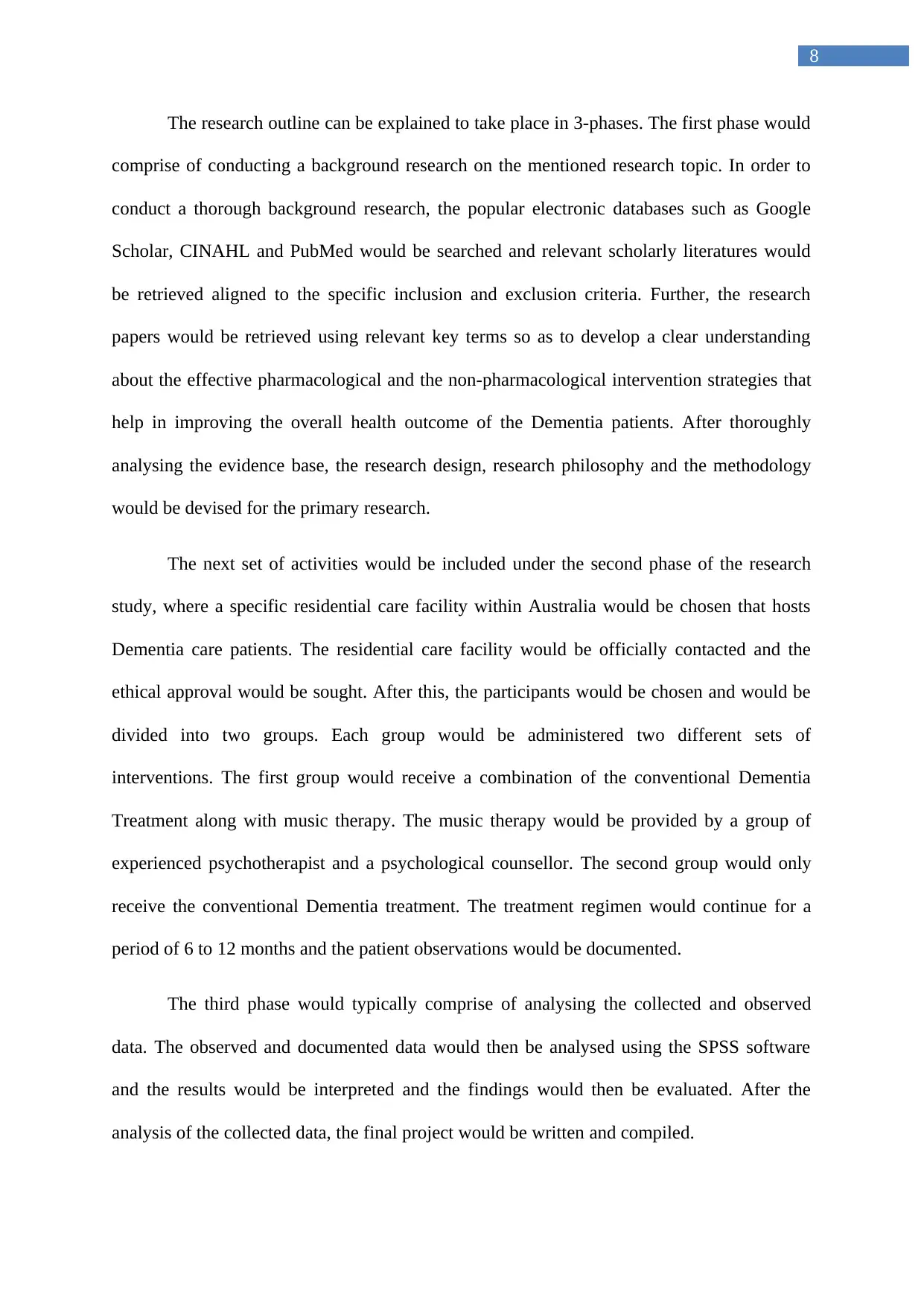
8
The research outline can be explained to take place in 3-phases. The first phase would
comprise of conducting a background research on the mentioned research topic. In order to
conduct a thorough background research, the popular electronic databases such as Google
Scholar, CINAHL and PubMed would be searched and relevant scholarly literatures would
be retrieved aligned to the specific inclusion and exclusion criteria. Further, the research
papers would be retrieved using relevant key terms so as to develop a clear understanding
about the effective pharmacological and the non-pharmacological intervention strategies that
help in improving the overall health outcome of the Dementia patients. After thoroughly
analysing the evidence base, the research design, research philosophy and the methodology
would be devised for the primary research.
The next set of activities would be included under the second phase of the research
study, where a specific residential care facility within Australia would be chosen that hosts
Dementia care patients. The residential care facility would be officially contacted and the
ethical approval would be sought. After this, the participants would be chosen and would be
divided into two groups. Each group would be administered two different sets of
interventions. The first group would receive a combination of the conventional Dementia
Treatment along with music therapy. The music therapy would be provided by a group of
experienced psychotherapist and a psychological counsellor. The second group would only
receive the conventional Dementia treatment. The treatment regimen would continue for a
period of 6 to 12 months and the patient observations would be documented.
The third phase would typically comprise of analysing the collected and observed
data. The observed and documented data would then be analysed using the SPSS software
and the results would be interpreted and the findings would then be evaluated. After the
analysis of the collected data, the final project would be written and compiled.
The research outline can be explained to take place in 3-phases. The first phase would
comprise of conducting a background research on the mentioned research topic. In order to
conduct a thorough background research, the popular electronic databases such as Google
Scholar, CINAHL and PubMed would be searched and relevant scholarly literatures would
be retrieved aligned to the specific inclusion and exclusion criteria. Further, the research
papers would be retrieved using relevant key terms so as to develop a clear understanding
about the effective pharmacological and the non-pharmacological intervention strategies that
help in improving the overall health outcome of the Dementia patients. After thoroughly
analysing the evidence base, the research design, research philosophy and the methodology
would be devised for the primary research.
The next set of activities would be included under the second phase of the research
study, where a specific residential care facility within Australia would be chosen that hosts
Dementia care patients. The residential care facility would be officially contacted and the
ethical approval would be sought. After this, the participants would be chosen and would be
divided into two groups. Each group would be administered two different sets of
interventions. The first group would receive a combination of the conventional Dementia
Treatment along with music therapy. The music therapy would be provided by a group of
experienced psychotherapist and a psychological counsellor. The second group would only
receive the conventional Dementia treatment. The treatment regimen would continue for a
period of 6 to 12 months and the patient observations would be documented.
The third phase would typically comprise of analysing the collected and observed
data. The observed and documented data would then be analysed using the SPSS software
and the results would be interpreted and the findings would then be evaluated. After the
analysis of the collected data, the final project would be written and compiled.
⊘ This is a preview!⊘
Do you want full access?
Subscribe today to unlock all pages.

Trusted by 1+ million students worldwide
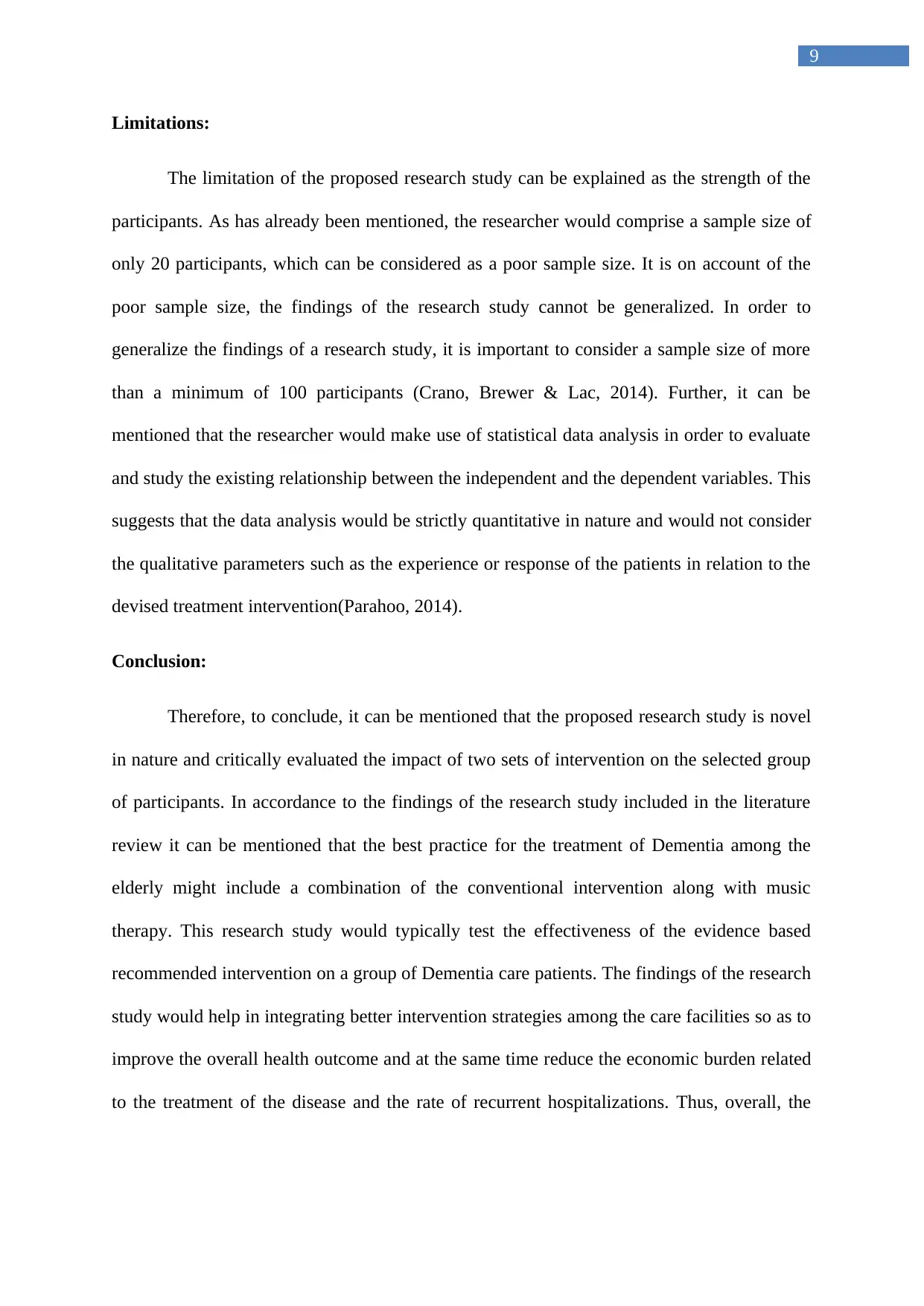
9
Limitations:
The limitation of the proposed research study can be explained as the strength of the
participants. As has already been mentioned, the researcher would comprise a sample size of
only 20 participants, which can be considered as a poor sample size. It is on account of the
poor sample size, the findings of the research study cannot be generalized. In order to
generalize the findings of a research study, it is important to consider a sample size of more
than a minimum of 100 participants (Crano, Brewer & Lac, 2014). Further, it can be
mentioned that the researcher would make use of statistical data analysis in order to evaluate
and study the existing relationship between the independent and the dependent variables. This
suggests that the data analysis would be strictly quantitative in nature and would not consider
the qualitative parameters such as the experience or response of the patients in relation to the
devised treatment intervention(Parahoo, 2014).
Conclusion:
Therefore, to conclude, it can be mentioned that the proposed research study is novel
in nature and critically evaluated the impact of two sets of intervention on the selected group
of participants. In accordance to the findings of the research study included in the literature
review it can be mentioned that the best practice for the treatment of Dementia among the
elderly might include a combination of the conventional intervention along with music
therapy. This research study would typically test the effectiveness of the evidence based
recommended intervention on a group of Dementia care patients. The findings of the research
study would help in integrating better intervention strategies among the care facilities so as to
improve the overall health outcome and at the same time reduce the economic burden related
to the treatment of the disease and the rate of recurrent hospitalizations. Thus, overall, the
Limitations:
The limitation of the proposed research study can be explained as the strength of the
participants. As has already been mentioned, the researcher would comprise a sample size of
only 20 participants, which can be considered as a poor sample size. It is on account of the
poor sample size, the findings of the research study cannot be generalized. In order to
generalize the findings of a research study, it is important to consider a sample size of more
than a minimum of 100 participants (Crano, Brewer & Lac, 2014). Further, it can be
mentioned that the researcher would make use of statistical data analysis in order to evaluate
and study the existing relationship between the independent and the dependent variables. This
suggests that the data analysis would be strictly quantitative in nature and would not consider
the qualitative parameters such as the experience or response of the patients in relation to the
devised treatment intervention(Parahoo, 2014).
Conclusion:
Therefore, to conclude, it can be mentioned that the proposed research study is novel
in nature and critically evaluated the impact of two sets of intervention on the selected group
of participants. In accordance to the findings of the research study included in the literature
review it can be mentioned that the best practice for the treatment of Dementia among the
elderly might include a combination of the conventional intervention along with music
therapy. This research study would typically test the effectiveness of the evidence based
recommended intervention on a group of Dementia care patients. The findings of the research
study would help in integrating better intervention strategies among the care facilities so as to
improve the overall health outcome and at the same time reduce the economic burden related
to the treatment of the disease and the rate of recurrent hospitalizations. Thus, overall, the
Paraphrase This Document
Need a fresh take? Get an instant paraphrase of this document with our AI Paraphraser
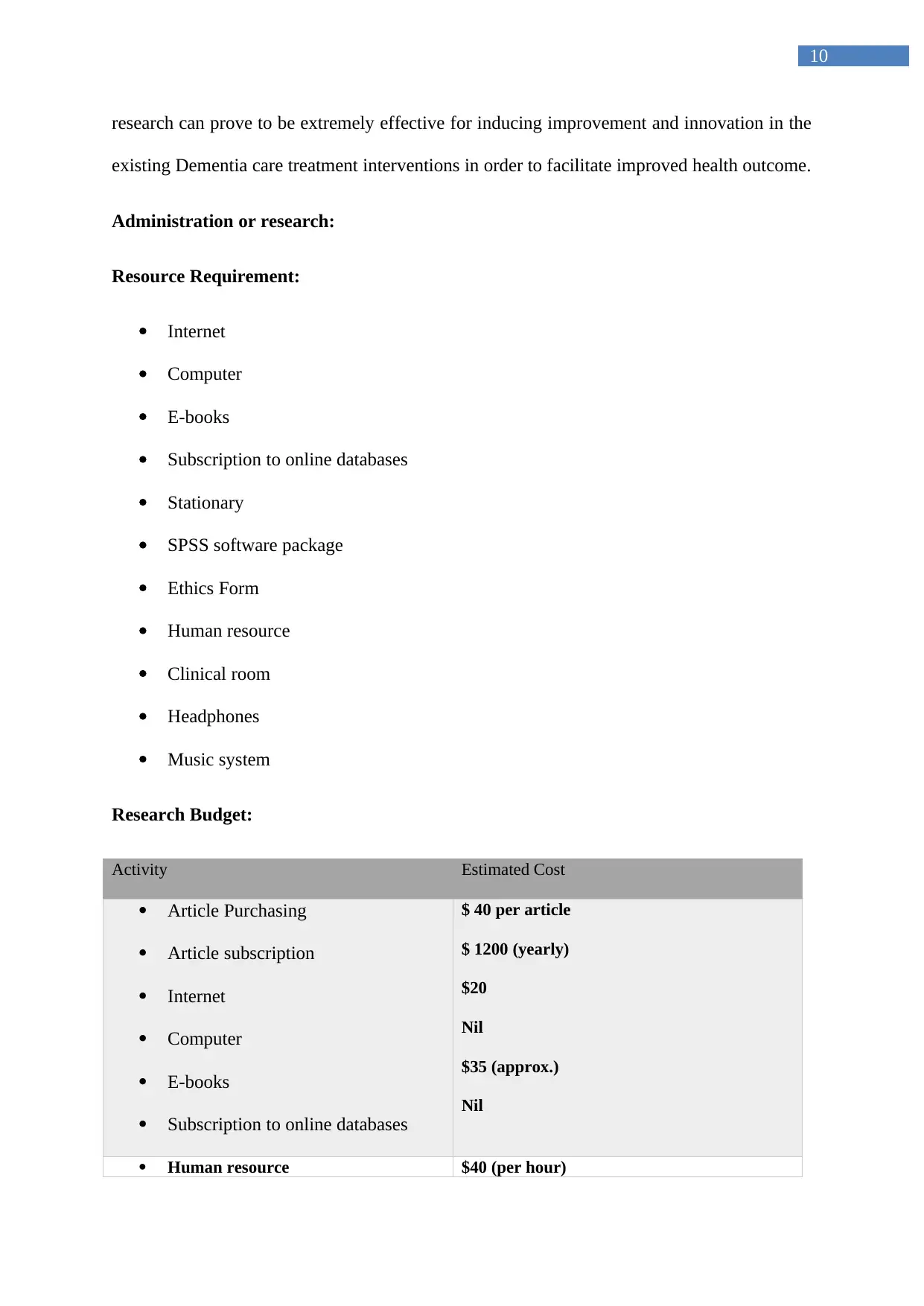
10
research can prove to be extremely effective for inducing improvement and innovation in the
existing Dementia care treatment interventions in order to facilitate improved health outcome.
Administration or research:
Resource Requirement:
Internet
Computer
E-books
Subscription to online databases
Stationary
SPSS software package
Ethics Form
Human resource
Clinical room
Headphones
Music system
Research Budget:
Activity Estimated Cost
Article Purchasing
Article subscription
Internet
Computer
E-books
Subscription to online databases
$ 40 per article
$ 1200 (yearly)
$20
Nil
$35 (approx.)
Nil
Human resource $40 (per hour)
research can prove to be extremely effective for inducing improvement and innovation in the
existing Dementia care treatment interventions in order to facilitate improved health outcome.
Administration or research:
Resource Requirement:
Internet
Computer
E-books
Subscription to online databases
Stationary
SPSS software package
Ethics Form
Human resource
Clinical room
Headphones
Music system
Research Budget:
Activity Estimated Cost
Article Purchasing
Article subscription
Internet
Computer
E-books
Subscription to online databases
$ 40 per article
$ 1200 (yearly)
$20
Nil
$35 (approx.)
Nil
Human resource $40 (per hour)
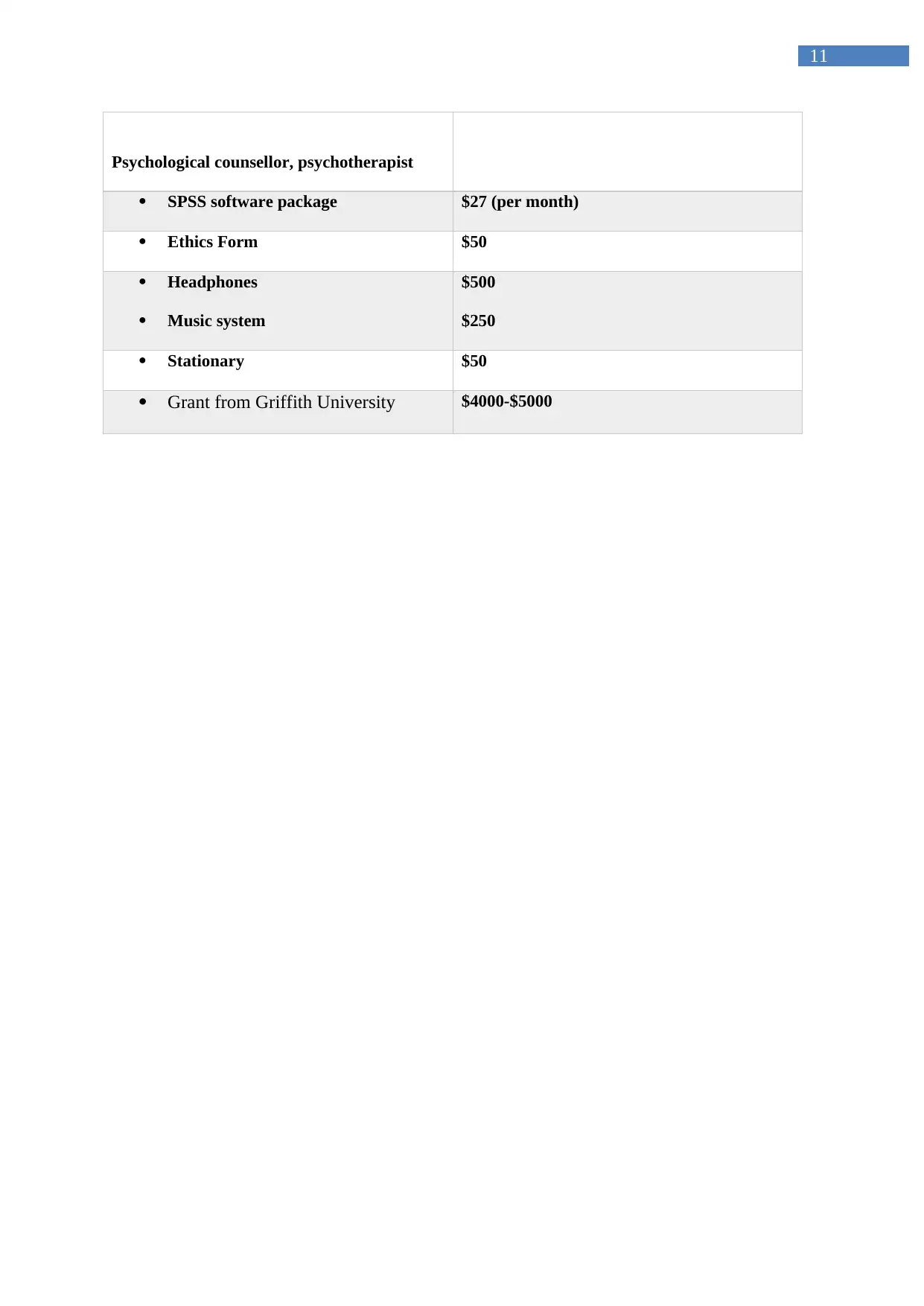
11
Psychological counsellor, psychotherapist
SPSS software package $27 (per month)
Ethics Form $50
Headphones
Music system
$500
$250
Stationary $50
Grant from Griffith University $4000-$5000
Psychological counsellor, psychotherapist
SPSS software package $27 (per month)
Ethics Form $50
Headphones
Music system
$500
$250
Stationary $50
Grant from Griffith University $4000-$5000
⊘ This is a preview!⊘
Do you want full access?
Subscribe today to unlock all pages.

Trusted by 1+ million students worldwide
1 out of 15
Related Documents
Your All-in-One AI-Powered Toolkit for Academic Success.
+13062052269
info@desklib.com
Available 24*7 on WhatsApp / Email
![[object Object]](/_next/static/media/star-bottom.7253800d.svg)
Unlock your academic potential
Copyright © 2020–2026 A2Z Services. All Rights Reserved. Developed and managed by ZUCOL.




